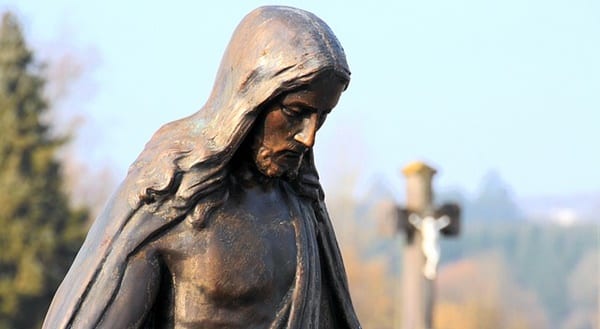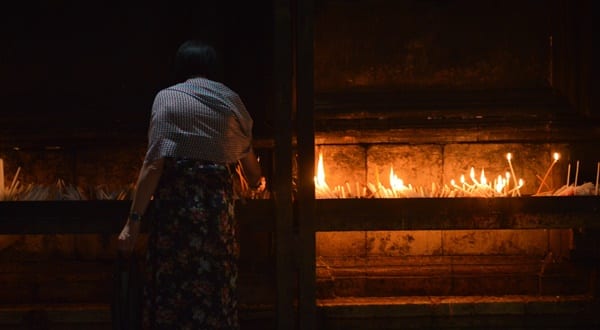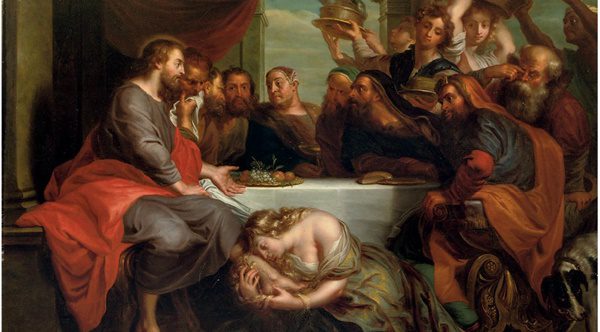
Spotlight has deservedly won the 2015 Academy Award for Best Picture. It’s a movie that Maria Montessori, the twentieth century’s most ardent defender of children’s rights, would have praised for its frank acknowledgment that children suffer silently while adults fight among themselves. Even when adults claim to be going to battle on behalf of children, the truth is less flattering and more damaging to children than we imagine.
The Urge to Scapegoat
Spotlight also wins praise from us at Teaching Nonviolent Atonement because of its extraordinary insights into the phenomenon of scapegoating. The movie treats us to an astonishing portrayal of the small Spotlight research team at the Boston Globe as good people in pursuit of the truth. Indeed, they are easy to admire. Led by a new editor in chief, the team courageously takes on the powerful and politically influential Catholic Church hierarchy. It’s something no one in very Catholic Boston has dared to do. But the truly astounding accomplishment of this movie is that it resists the pull to scapegoat the Catholic Church and so does not settle for easy answers.
The question that haunts the movie and motivates the reporters is why has something so pervasive gone on for so long without anyone finding out? At first it seems that the blame may fall squarely on one or two bad actors, and Cardinal Law certainly rises to the challenge of convincingly filling that role. Choosing instead to protect the offenders, Cardinal Law approved the shuttling of priests between parishes and a program of silencing parent protests. It appears as if Cardinal Law is guilty of scapegoating children in his zeal to protect the church’s reputation.
Of Heroes and Villains
When a villain is so obvious, crusaders for truth can be forgiven for believing that justice will be served when the villain is exposed and held accountable. This movie, however, does not fall into that trap. Even as it goes after the powerful villains, it uncovers guilt and sin nearly everywhere it looks. In a wrenching revelation, the parents of the victims are implicated in the protection of the abusive priests. As survivors and parents explain, to them the priests were like gods and so their attention was courted and welcomed. When it turned abusive, parents were so bewildered and ashamed that they retreated into stunned incredulity.
Even as all this comes to light, however, the Spotlight team still sees their mission as a black and white battle between the forces of good (themselves) and the evil but powerful Church hierarchy. In this scenario, the parents were as much victims of the big bad Church as the children. And we, the audience, know the outcome and eagerly anticipate the spectacle of this tiny team of Davids bringing down Cardinal “Goliath” Law by slinging words with lethal aim.
But this wise and wonderful movie deprives us of our satisfaction as our heroes come to realize their own complicity in the cover-up. They have kept asking how this abuse could have gone on unnoticed for so long, convinced, of course, that had they known earlier they would have blown the whistle earlier. The answer they uncover is the uncomfortable truth that they did know and they did nothing. Their own paper published an article many years earlier on the abuse scandal with information sufficient to cause scandal and demand accountability, but it buried the story on the back pages and no one ever followed up.
I believe that the most heroic thing the Spotlight team did was to follow their investigation beyond the truth they wanted to find. The discovery that Cardinal Law’s guilt was only the tip of the iceberg reveals that only taking down Cardinal Law would have been to make a scapegoat of the Cardinal to protect themselves from their share of the blame.
Bringing Down the System
The editor had launched the Spotlight team on their investigation by saying that he wants more than to bring down one bad actor. He wants to bring down the entire system that enabled something so horrific to go on for so long. That system, it turns out, runs deeper than one institution. It’s the values system we all share, one that devalues all the things that are the qualities of childhood: innocence, trust, humility, weakness, unabashed love and a willingness to forgive.
Montessori, writing about the relationship between children and the Catholic faith, pointed out that the qualities of childhood reveal the living presence of God in our midst. God is not a power broker protecting his political position by sacrificing the weakest members of his family. God is like a child, loving and merciful, and when we silence children, Montessori warned us, we are silencing the voice of God. She writes:
In the society of adults, a tyrant used to be recognized as the elect of God. But to the child a grown-up person represents God himself. It is beyond discussion; in fact the only person who could discuss it is the child, and he remains silent. He accommodates himself to everything, believes everything, pardons everything. When he is punished he does not try to justify himself, and willingly asks the pardon of any angry person, forgetting to inquire how he has given offense. (The Child in the Church, Maria Montessori)
This is a moving and accurate picture of the child in our midst who offers us unconditional love despite our neglect, disrespect, and even our abuse. If we are horrified by what children suffered at the hands of the Catholic Church, we must not let our outrage convince us of our innocence. We must refuse the urge to scapegoat and instead take responsibility for our own failures to protect the most vulnerable among us. For if we wish to see the face of God, we need only gaze upon a child.
Stay in the loop! Like Teaching Nonviolent Atonement on Facebook!











